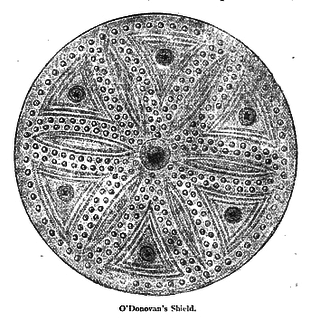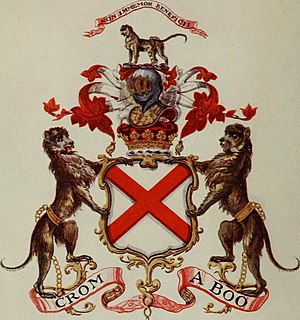
The Kingdom of Desmond was a historic kingdom in southwestern Ireland. It was founded in 1118 by king Tadhg Mac Cárthaigh, when the Treaty of Glanmire formally divided the Kingdom of Munster into Desmond and Thomond. It comprised all of what is now County Cork and most of County Kerry. Desmond was ruled by the Mac Cárthaigh (MacCarthy) dynasty. Other clans within the kingdom included the O'Sullivans and O'Donovans. Following the Norman invasion of Ireland in the late 12th century, the eastern half of Desmond was conquered by the Anglo-Normans and became the Earldom of Desmond, ruled by the FitzGeralds and Fitzmaurices. The king of Desmond, Diarmaid Mac Cárthaigh, submitted to Henry II of England, but the western half of Desmond lived on as a semi-independent Gaelic kingdom. It was often at war with the Anglo-Normans. Fínghin Mac Carthaigh's victory over the Anglo-Normans at the Battle of Callann (1261) helped preserve Desmond's independence. The kings of Desmond founded sites such as Blarney Castle, Ballycarbery Castle, Muckross Abbey and Kilcrea Friary. Following the Nine Years' War of the 1590s, Desmond became part of the Kingdom of Ireland.

MacCarthy, also spelled Macarthy, McCarthy or McCarty, is a Gaelic Irish clan originating from Munster, an area they ruled during the Middle Ages. It was and continues to be divided into several great branches. The MacCarthy Reagh, MacCarthy of Muskerry, and MacCarthy of Duhallow dynasties were the three most important of these, after the central or MacCarthy Mór line.
Finnian or Fínghin mac Donnchadh Mac Cárthaigh (1560–1640), known to the English as Florence MacCarthy, was an Irish prince of the late 16th century and the last credible claimant to the MacCarthy Mór title before its suppression by English authority. MacCarthy's involvement in the Nine Years' War (1595–1603) led to his arrest by the Crown, and he spent the last 40 years of his life in custody in London. His lands were distributed among his relatives and English colonists.

The Battle of Callann was fought in August 1261 between the Hiberno-Normans, under John FitzGerald, and three Gaelic clans: MacCarthy, who held the Kingdom of Desmond, and their kinsmen, the O'Sullivans, and the O'Donoghues under Fínghin Mac Carthaigh, King of Desmond, ancestor of the MacCarthy Reagh dynasty. It took place in the townland of Callann or Collon near modern-day Kilgarvan, County Kerry. MacCarthaigh was victorious.

The Book of Lismore is a Medieval Irish manuscript. It was so named by Dennis O'Flynn, a historian in Cork, to whom it had been given in 1815. Eugene O'Curry blamed O'Flynn, in 1855, for splitting the book into parts and selling them off separately to collectors.

The MacCarthy Reagh dynasty are a branch of the great MacCarthy dynasty, Kings of Desmond, deriving from the ancient Eóganachta, of the central Eóganacht Chaisil sept.

Donal II O'Donovan, The O'Donovan of Clann Cathail, Lord of Clancahill, was the son of Ellen O'Leary, daughter of O'Leary of Carrignacurra, and Donal of the Skins, The O'Donovan of Clann Cathail. He is most commonly referred to as Donnell O'Donevane of Castledonovan in contemporary references of his time.

Carbery, or the Barony of Carbery, was once the largest barony in Ireland, and essentially a small, semi-independent kingdom on the southwestern coast of Munster, in what is now County Cork, from its founding in the 1230s by Donal Gott MacCarthy to its gradual decline in the late 16th and early 17th centuries. His descendants, the MacCarthy Reagh dynasty, were its ruling family. The kingdom officially ended in 1606 when Donal of the Pipes, 13th Prince of Carbery chose to surrender his territories to the Crown of England; but his descendants maintained their position in Carbery until the Cromwellian confiscations, following their participation in the Irish Rebellion of 1641.
Finghin MacCarthy Reagh was the 8th Prince of Carbery from 1477 to his death in 1505. He belonged to the MacCarthy Reagh dynasty, and was the eldest son of Dermod an Duna MacCarthy Reagh, 7th Prince of Carbery. He was born in 1425 or 1430.
Donal Gott MacCarthy was the ancestor of the MacCarthy Reagh dynasty of Carbery in the south of Munster in Ireland, and King of Desmond from 1247 or 1248 until the time of his death, after holding the position of tánaiste from 1230.
The MacCarthy dynasty of Muskerry is a branch of the great MacCarthy Mor dynasty, the Kings of Desmond. Their branch descends from Dermod Mor MacCarthy, 1st Lord of Muscry (1310-1367/8), second son of Cormac MacCarthy Mor (1271–1359), King of Desmond.
Donal MacCarthy Reagh (1450/1460–1531) was the 9th Prince of Carbery from 1505 to his death in 1531. He belonged to the MacCarthy Reagh dynasty, and was the son of Finghin MacCarthy Reagh, 8th Prince of Carbery, and Lady Catherine FitzGerald, daughter Thomas FitzGerald, 7th Earl of Desmond.

John FitzThomas FitzGerald, 1st Baron Desmond was the son of Thomas FitzMaurice FitzGerald by his wife Ellinor, daughter of Jordan de Marisco, and sister of Geoffrey de Marisco, who was appointed justiciar of Ireland in 1215. He was the grandson of Maurice FitzGerald, Lord of Lanstephan.
Amlaíb Ua Donnubáin is the last member of the O'Donovan family to be styled king of Uí Chairpre Áebda in the Irish annals, and in fact the very last known king of this people.
An Crom Ua Donnubáin or Crom O'Donovan is the individual characterized as the ancestor of O'Donovans later found in Carbery in County Cork, and later still in distant County Wexford in Leinster. Nothing is known for sure of his life but his progeny, and the circumstances of his slaying and further events which followed. He was the son of Máel Ruanaid,, son of Aneislis, son of Murchad, son of Amlaíb, son of Cathal, son of Donnubán,, son of Cathal. An uncle or near relation was Amlaíb Ua Donnubáin, last known king of Uí Chairpre Áebda, slain in 1201.
Tadhg na Mainistreach Mac Carthaigh Mór reigned as King of Desmond from 1390/2 to his death in 1428. He was the son of the previous king Domhnall Óg Mac Carthaigh Mór. According to the Annals of Inisfallen Tadhg Mac Carthaigh had the reputation as the greatest wine-drinker in Ireland when he died, but was still "a son worthy of his father." He was married to one Sebán, a daughter of "Garret the earl,"; this is probably a reference to Joanne, daughter of Maurice FitzGerald, 4th Earl of Kildare, who married into the MacCarthy dynasty.
Muskerry West is one of the baronies of Ireland, a historical geographical unit of land. Its chief town is Macroom. It is one of 24 baronies in the county of Cork. It may also be viewed as a half barony because sometime before the 1821 census, it was divided from its other half – Muskerry East. Other neighbouring baronies include Duhallow to the north and the Barony of Carbery East to the south.
Muskerry East is one of the baronies of Ireland, an historical geographical unit of land. Its chief town is Ballincollig. It is one of 24 baronies in the county of Cork. It may also be viewed as a half barony because some time before the 1821 census data, it was divided from its other half - Muskerry West. Other neighbouring baronies include Cork to the east, Duhallow to the north and the Barony of Barretts to the north-east.

Katherine Fitzgerald (c.1452-1506) was an Anglo-Irish Noblewoman of the Geraldine's dynasty, during the 15th century. At the time of her birth, her family was one of the most influential houses of Ireland. By her husband, her married name was Mac Carthaigh Riabhach and she became the princess of Carbery from 1477 to 1506.










